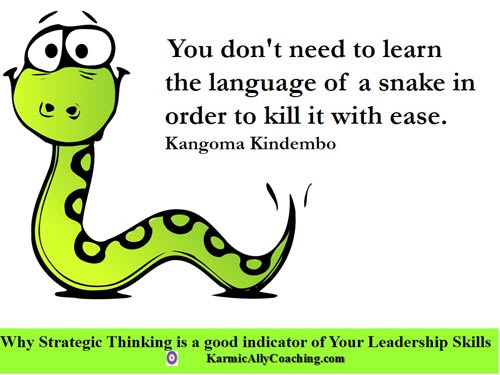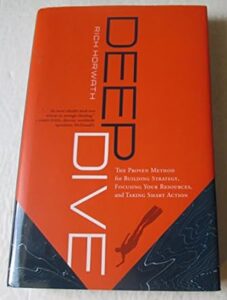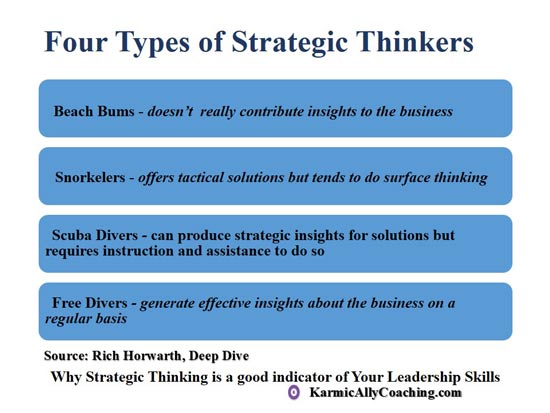
Do you use strategic thinking? More importantly does your organization think you have this leadership skill?
While Strategic thinking is a powerful tool in the leadership of an organization, it’s becoming even more important for professionals who want to climb the corporate ladder and be seen as potential leaders.
Back in the day when I worked in the insurance industry, our headcount was also reviewed during annual budgeting time and we were perpetually being asked to trim it. The goal was to be lean and productive.
It’s still the same story today with managers being asked to be productive with fewer resources. This is where strategy comes into play.
Do you know how to allocate your resources, whether they are manpower, time or company assets optimally?
Are you able to take a Helicopter View when solving problems or coming up with new ideas and innovations?
Do you have a well-developed out of box thinking skill?
If yes, then you’re a good strategist. Sadly, many managers do require training in developing and upgrading this skill.
The ability to think in strategic terms isn’t a black and white skill but comes in varying degrees, ranging from brilliant to non-existent.
This point is brought out by Rich Horwath in his book Deep Dive: The Proven Method for Building Strategy, Focusing Your Resources, and Taking Smart Action.
To home in on one’s ability to think, he took the results of research conducted among senior managers from 154 companies and found that only 3 out of 10 managers were strategic.
No wonder employers who have short-listed managers for the next level are often willing to sponsor their employee for courses and workshops to develop this skill.
They know all too well that this valuable skill will give the manager the foresight and insight needed for success over the long term when applied throughout the organization.
Where are you on the spectrum of Strategic Thinkers?
Horwath used 2 criteria to consider while evaluating an individual’s ability to provide strategic insight – “Impact of Insights” and “Frequency of Insights.”
Using the analogy of underwater diving to explain the types of strategic thinkers, Horwath compared the 4 types of divers to the 4 types of strategic thinkers as shown in the diagram below.
The images that come to mind when reading the types definitely point out where we stand on the spectrum and what we need to improve.
Beach Bums
They sit on the shore and make no attempt to enter the water. This type of manager doesn’t contribute insight into the business.
Snorkelers
They swim on the surface of the water, equipped with a diving mask and swim fins. This type of manager offers tactical solutions to issues, but they tend to do surface thinking and seldom get to the heart of an issue.
Scuba Divers
They swim underwater wearing a diving mask, swim fins, a wet suit, and a portable apparatus containing compressed air. This type of manager can produce strategic insights for solutions but requires instruction and assistance to do so.
Free Divers
They dive underwater without the assistance of a portable breathing apparatus in an attempt to attain great depths. These managers generate effective insights about the business on a regular basis.
Imagine, based on the research, only 3 in 10 managers are Free Divers!
More Reasons for developing Strategic Thinking
You know from your own experience that employees and people in general, value leaders who are not focused solely on solving the problem of today but are looking to the future as well.
Leaders plan ahead and figure out what needs to be done today, tomorrow and the years ahead to get there.
They also know how to articulate their vision to inspire others.
Improving your strategic thinking skills and implementing those skills with others makes you a better communicator.
Effective communication is a top attribute of a leader who is a strategic thinker.
By developing good communication skills and being able to clearly describe what actions you want your team to take, you also unite everyone to work together.
Being a good communicator means having an open-door policy and having one-on-one meetings regularly with team members. You make yourself accessible to discuss anything.
Communication includes having good listening skills as well. It’s important to listen to what your employees or team members have to say. Leaders speak and hear well.
The boss who demonstrates that he or she is aware of their concerns is remembered years later as a good leader because they felt heard. They kept the team morale high even during difficult times.
Good leaders ask others for their input on problems and consider other solutions.
Giving constructive feedback to team members along the way helps them understand what’s working or not as well as a chance to use the insight right away.
By doing this, your team members respect you and trust you to help them do the right thing.
Strategic thinking leaders have a collaborative approach that creates transparency in the business.
Being genuinely interested in collaborating with your team lets them know what you’re thinking and you to know what they are thinking. This leads to trust.
A strategic thinking leader is forthright about their success, failures, and the reasons for choosing certain goals or plans over others.
This level of honesty and responsibility earns the respect of their team and encourages the team to follow suit.

Passion and commitment show through from your enthusiasm for project or your mission. This gets others excited because they see and feel your excitement.
Commitment is what gets the job done with the ability to stay focused on what you need to do to be successful.
Showing your team that you are passionate and committed means doing the work alongside them. They see this, increasing their motivation and respect for you.
Improving your strategic thinking skills make you a better leader since your team members see you being passionate and committed to your goal.
They feel they can trust you because you are honest about the project or goal and all the ups and downs that go with it.
Your open communication and good listening skills leaves the door open for them to be able to come to you when they have problems or ideas.
Final Thoughts on Strategic Thinking and improving Leadership Skills
This skill is a critical part of life, but especially in business. Leaders possess a lot of strategic thinking skills.
Business owners must be strategic thinkers to operate their businesses at maximum efficiency.
Our actions must be planned to give the desired results, especially if you’re thinking of changing career or business tracks right now.
It’s important to invest our time wisely to get the maximum return on our efforts.
The good news is everyone can develop and strengthen their strategic thinking skills. It isn’t hard – just takes practice and a little know how.
If this is an area that you want to develop on your own then check out the Strategic Thinking Bundle.






 I adhere to the Certified Coaches Alliance Code of Ethics and Standards. A copy is available on request.
I adhere to the Certified Coaches Alliance Code of Ethics and Standards. A copy is available on request.
 Let's Talk through the Connect Form:
Let's Talk through the Connect Form: